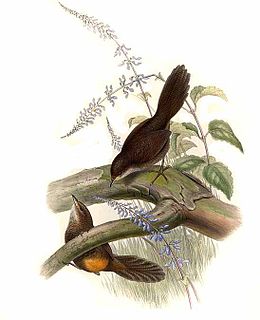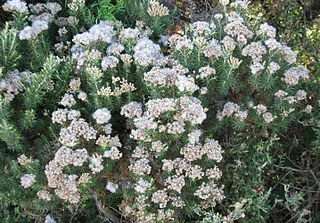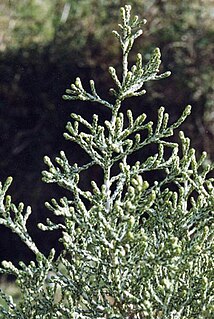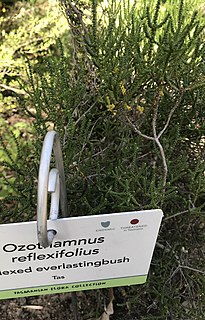
Cunnawarra is a national park located in New South Wales, Australia, 80 kilometres (50 mi) east of Armidale, 10 kilometres (6.2 mi) off the Waterfall Way and 565 kilometres (351 mi) north of Sydney. The 25-kilometre (16 mi) Styx River Forest Way runs from the Point Lookout Road through Cunnawarra National Park to the Kempsey Road. The New England National Park adjoins the Cunnawarra National Park on the north-eastern boundary and the Oxley Wild Rivers National Park joins it on the southern corner.

Alchornea is a plant genus of the family Euphorbiaceae first described as a genus in 1788. It is widespread in tropical and subtropical regions of Africa, South Asia, Australia, Latin America, and various oceanic islands. Molecular phylogenetic analyses suggest that Bocquillonia from New Caledonia is nested in Alchornea.

Ozothamnus is a genus of plants found in Australia, New Zealand and New Caledonia.

Ozothamnus diosmifolius is an erect, woody shrub in the family Asteraceae and is endemic to eastern Australia. Common names for this species include rice flower, white dogwood, pill flower and sago bush. It has dense heads of small white "flowers" and is often used in floral arrangements.

The rufous rat-kangaroo or rufous bettong is a small, jumping, rat-like mammal native to eastern Australia. It is the only species in the genus Aepyprymnus. The largest member of the rat-kangaroo family (Potoroidae), it is about the size of a rabbit. The rufous rat-kangaroo is active at night when it digs for plant roots and fungi, and like other marsupials it carries its young in a pouch. Though its range is reduced, the population is healthy and stable.

The rufous scrubbird is a bird species in the family Atrichornithidae. It is endemic to Australia.

Ozothamnus ferrugineus, commonly known as tree everlasting, is a member of the genus Ozothamnus, of the Asteraceae family – one of the largest families of flowering plants in Australia. Native to the Australian states of New South Wales, Victoria, South Australia, and Tasmania, it forms an erect shrub or small tree between 2 and 3 metres in height.

Ozothamnus turbinatus, the coast everlasting, is a shrub in the family Asteraceae, native to the states of New South Wales, Victoria, South Australia and Tasmania in Australia. It grows to between 1 and 2 metres in height.

Ozothamnus obcordatus, the grey everlasting, is a shrub in the family Asteraceae, native to the states of Queensland, New South Wales, Victoria and Tasmania in Australia.

Ozothamnus secundiflorus, the cascade everlasting, is an aromatic shrub species, endemic to Australia. It grows to between 0.5 and 2 metres in height. Leaves are 6 to 10 mm long and 1.5 to 4 mm wide. These are dark green with grey hairs on the upper surface, and white tomentose below. The white flower heads appear in dense clusters along one side of the stem between December and February in the species' native range.

Ozothamnus hookeri, commonly known as kerosene bush, is an aromatic shrub species, endemic to Australia. It grows to between 0.5 and 1 metre in height and has white-tomentose branchlets. The scale-like leaves are 4 to 5 mm long and 0.5 to 1 mm wide. These are green on the upper surface, and white tomentose below. The flower heads appear in dense clusters in summer and autumn The species occurs in boggy sites and subalpine heathland New South Wales and Tasmania.

Ozothamnus cupressoides is an aromatic shrub species, endemic to Australia. Common names include scaly everlasting, lattice everlasting or kerosene bush. It grows to between 0.5 and 1 metre in height and has white-tomentose branchlets. The scale-like leaves are 1 to 3 mm long and 0.5 to 1 mm wide. These are green on the upper surface, and white tomentose below. The flower heads appear in dense clusters in summer and autumn The species occurs in boggy sites and subalpine heathland in New South Wales and Victoria. It was first formally described in 2010 in the journal Muelleria.

Pararguda rufescens is a moth of the family Lasiocampidae. It is known from Australia, including New South Wales, Queensland, South Australia, Tasmania, Victoria and Western Australia.

Ozothamnus alpinus, commonly known as alpine everlasting, is a flowering plant in the family Asteraceae. It is endemic to alpine and subalpine areas in south-eastern continental Australia.

Ozothamnus cuneifolius, commonly known as wedge-leaf everlasting or wedge everlasting, is a shrub in the family Asteraceae. It is native to forests of the south-east of New South Wales and Gippsland in Victoria in Australia.

Ozothamnus leptophyllus, commonly known as tauhinu or cottonwood, is an endemic shrub of New Zealand. Tauhinu is fast-growing, reaching 2 metres in height and is a common plant of coastal farmland. This species is host to the larvae of the New Zealand endemic moth Homoeosoma anaspila.

Pyrgotis plagiatana is a species of moth of the family Tortricidae. It is found in New Zealand.
Ozothamnus thyrsoideus, commonly known as sticky everlasting, is a flowering shrub, endemic to south-eastern Australia. It grows to between 0.5 and 2 metres in height. Leaves are 15 to 30 mm long and 1.5 to 2 mm wide. Flowerheads appear in terminal corymbs in the summer.

Metatropis rufescens is a species of true bugs. The species is found in Europe, with the exception of the far North and South then East to the Black Sea region and across the Palearctic to Siberia. In Central Europe it is common, but it is not found everywhere. In the British Isles it is common in the South including Wales and Ireland. It occurs in shady, mostly moist habitats in deciduous forests.

Ozothamnus reflexifolius, commonly known as reflexed everlastingbush, is a flowering plant in the family Asteraceae. It is known from only a single population in the Meehan Range, south-eastern Tasmania. It is thought to be closely related to O. lycopodioides and O. selaginoides.



















